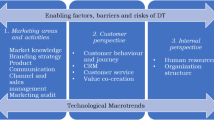Abstract
This study explores the relationship between logistics capabilities and sustainable competitive advantage by using the notion of learning mechanisms. It is argued that a set of processes of learning mechanisms may serve as a source of dynamic capabilities that create, develop and maintain logistics capabilities in their role as source of a company’s sustainable competitive advantage. The learning mechanisms, in the form of experience accumulation, knowledge articulation and codification, are identified in two best-practice companies within logistics. Results imply that the origin of the sustainability of a logistics-based company’s competitive advantage may be found in the dynamics of organisational learning, ultimately based on trial and error and experience accumulation. As such, the research elaborates on the connection between logistics capabilities and strategic competitive advantage, with learning as mediating dynamic capability.


Similar content being viewed by others
References
Abrahamsson M, Aldin N, Stahre F (2003) Logistics platforms for improved strategic flexibility. Int J Logist Res Appl 6:85–106
Barney J, Clark D (2007) Resource-based theory: creating and sustaining competitive advantage. Oxford University Press, Oxford
Eisenhardt K (1989) Building theories from case study research. The Acad Manage Rev 14:532–550
Eisenhardt K, Martin J (2000) Dynamic capabilities: what are they? Strat Manage J 21:1105–1121
Eisenhardt K, Graebner M (2007) Theory building from cases: opportunities and challenges. Acad Manage J 50:25–32
Esper T, Fugate B, Davis-Sramek B (2007) Logistics learning capability: sustaining the competitive advantage through logistics leverage. J of Bus Logist 28:57–81
Ferdows K, Lewis M, Machuca J (2004) Rapid fire fulfilment. Harv Bus Rev 82:104–110
Flyvbjerg B (2006) Five misunderstandings about case study research. Qual Inq 12:219–245
Gagnon S (1999) Resource-based competition and the new operations strategy. Int J Op Prod Manage 19:125–138
Helfat C, Finkelstein S, Mitchell W, Peteraf MA, Singh H, Teece D, Winter S (2007) Dynamic capabilities: understanding strategic change in organizations. Blackwell Publishing, New York
Helfat C, Peteraf M (2003) The dynamic resource-based view: capability life cycles. Strat Manage J 24:997–1010
Huber G (1991) Organizational learning: the contributing processes and the literature. Org Sci 2:88–116
Hult G, Ketchen D, Arrfelt M (2007) Strategic supply chain management: improving performance through a culture of competitiveness and knowledge development. Strat Manage J 28:1035–1052
Levitt B, March J (1988) Organizational learning. Annu Rev Sociol 14:319–340
Mentzer JT, DeWitt W, Keebler JS, Soonhoong M, Nix NW, Smith CD, Zacharia ZG (2001) Defining supply chain management. J Bus Logist 22:1–25
Nonaka I (1994) A dynamic theory of knowledge creation. Org Sci 5:14–37
Nonaka I, Takeuchi H (1995) The knowledge-creating company. Oxford University Press, Oxford
Olavarrieta S, Ellinger A (1997) Resource-based theory and strategic logistics research. Int J Phys Distrib Logist Manage 27:559–587
O’Marah K, Hofman D (2009) Top 25 supply chains. Supply Chain Manage Rev 13:12–19
Penrose EG (1959) The theory of the growth of the firm. Oxford university press, Oxford
Peteraf M (1993) The cornerstones of competitive advantage: a resource based view. Strat Manage J 14:179–191
Porter ME (1996) What is strategy? Harv Bus Rev 74:61–78
Teece D, Pisano G, Shuen A (1997) Dynamic capabilities and strategic management. Strat Manage J 18:509–533
Teece D (2007) Explicating dynamic capabilities: the nature and microfoundations of (sustainable) enterprise performance. Strat Manage J 28:1319–1350
Tracey M, Lim J-S, Vonderembse M (2005) The impact of supply-chain management capabilities on business performance. Supply Chain Manage: Int J 10:179–191
Weick K (1979) The social psychology of organizing. McGraw Hill, New York
Winter S (2003) Understanding dynamic capabilities. Strat Manage J 24:991–995
Zollo M, Winter S (2002) Deliberate learning and the evolution of dynamic capabilities. Org Sci 13:339–351
Author information
Authors and Affiliations
Corresponding author
Rights and permissions
About this article
Cite this article
Sandberg, E., Åman, P. Logistics learning mechanisms and capabilities: towards an understanding of sustainable competitive advantage. Logist. Res. 2, 97–108 (2010). https://doi.org/10.1007/s12159-010-0029-2
Received:
Accepted:
Published:
Issue Date:
DOI: https://doi.org/10.1007/s12159-010-0029-2




